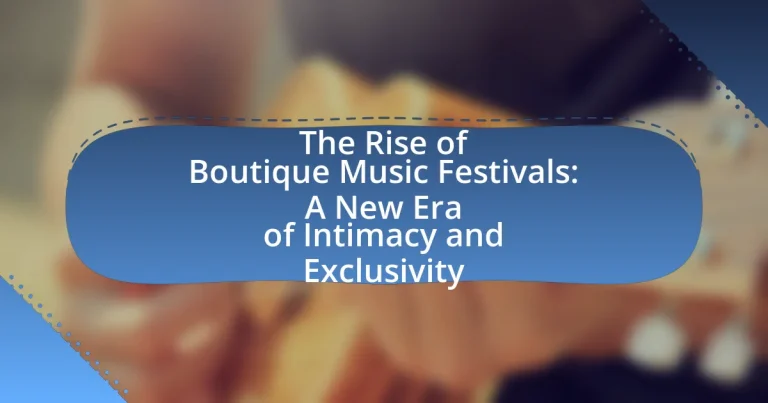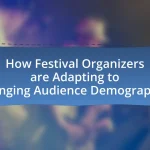Boutique music festivals represent a growing trend in the music industry, characterized by their small scale, curated lineups, and intimate atmospheres that prioritize quality experiences over mass attendance. These festivals differentiate themselves from traditional events by offering unique settings, enhanced amenities, and a focus on niche genres, fostering a sense of community among attendees. The rise of boutique festivals has been influenced by cultural shifts towards personalization and exclusivity, as well as the impact of social media in promoting unique experiences. However, organizers face challenges such as high operational costs, competition, and logistical complexities that can affect the sustainability of these events.
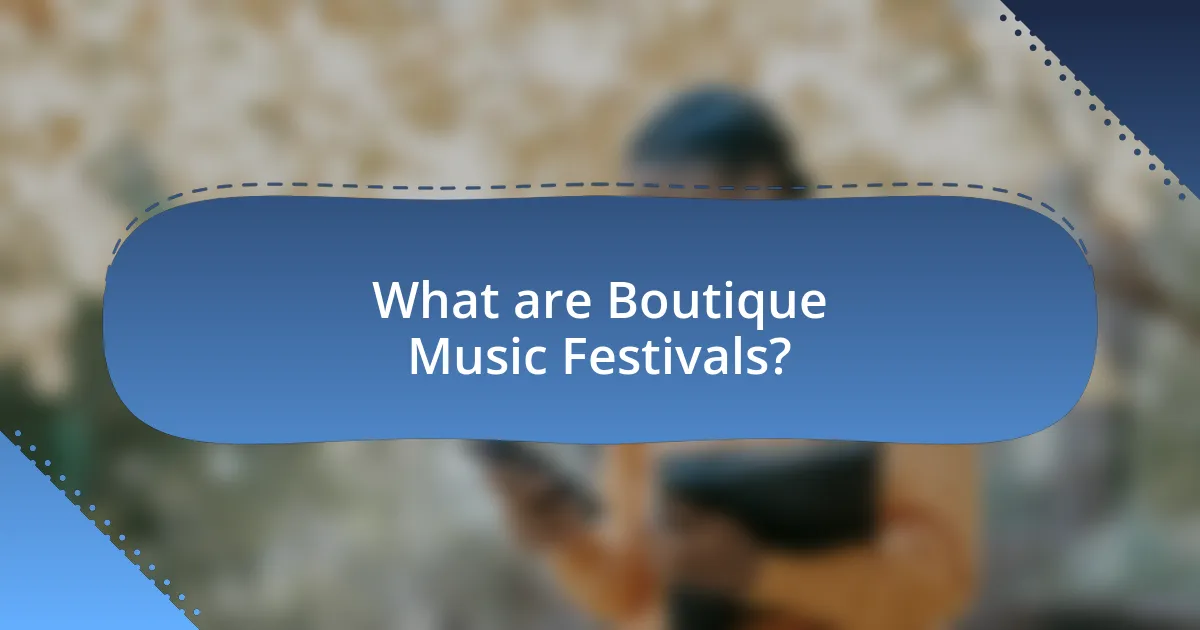
What are Boutique Music Festivals?
Boutique music festivals are small-scale, curated events that focus on providing an intimate and exclusive experience for attendees. These festivals typically feature a limited number of artists, often emphasizing quality over quantity, and create a unique atmosphere through personalized services, themed environments, and enhanced amenities. The rise of boutique music festivals has been driven by a growing demand for unique experiences, with events like Coachella’s VIP offerings and smaller festivals such as Desert Daze exemplifying this trend.
How do Boutique Music Festivals differ from traditional music festivals?
Boutique music festivals differ from traditional music festivals primarily in their scale, atmosphere, and audience experience. Boutique festivals are typically smaller, featuring a limited number of attendees, which fosters a more intimate environment. This smaller scale allows for unique programming, often focusing on niche genres or curated lineups that emphasize quality over quantity. For instance, events like the Desert Daze festival in California prioritize artistic expression and immersive experiences, contrasting with larger festivals like Coachella that cater to mass audiences with mainstream acts. Additionally, boutique festivals often offer enhanced amenities, such as gourmet food options and luxury accommodations, further differentiating them from the more commercialized and crowded traditional festivals.
What unique features define Boutique Music Festivals?
Boutique music festivals are characterized by their intimate atmosphere, exclusive lineups, and unique locations. These festivals typically feature a smaller number of attendees, allowing for a more personal experience between artists and fans. Additionally, they often emphasize curated music selections, showcasing emerging artists alongside established acts, which fosters a sense of discovery. The settings for boutique festivals are frequently chosen for their aesthetic appeal, such as picturesque landscapes or unique venues, enhancing the overall experience. This combination of intimacy, exclusivity, and distinctive environments sets boutique music festivals apart from larger, mainstream events.
Why are smaller capacities significant for the festival experience?
Smaller capacities are significant for the festival experience because they foster a more intimate and engaging atmosphere for attendees. This intimacy allows for closer interactions between artists and fans, enhancing the overall enjoyment and connection to the music. Research indicates that boutique festivals, which typically feature smaller crowds, often report higher satisfaction levels among participants due to personalized experiences and reduced overcrowding. For example, a study by Eventbrite found that 78% of attendees at smaller festivals felt a stronger sense of community compared to larger events. This sense of belonging and connection is a key factor in the appeal of boutique music festivals.
What is the history behind the rise of Boutique Music Festivals?
The rise of boutique music festivals began in the early 2000s as a response to the overcrowded and commercialized nature of larger music festivals. These smaller festivals focused on creating intimate experiences, emphasizing unique lineups, and fostering community engagement. For instance, events like Coachella and Bonnaroo, which initially catered to mass audiences, inspired a shift towards more curated and exclusive gatherings, such as the Desert Daze and the All Points East festivals. By 2010, the trend gained momentum, with boutique festivals often featuring local artists, gourmet food options, and immersive art installations, appealing to a demographic seeking authenticity and connection. This evolution reflects a broader cultural shift towards personalized experiences in entertainment, supported by the growing demand for unique and memorable events.
How have cultural shifts influenced the popularity of these festivals?
Cultural shifts have significantly influenced the popularity of boutique music festivals by prioritizing unique experiences and community engagement over large-scale events. As society increasingly values personalization and exclusivity, festivals that offer intimate settings, curated lineups, and immersive activities have gained traction. For instance, the rise of social media has enabled festival-goers to share their experiences, creating a demand for distinctive and memorable events that stand out from mainstream festivals. Additionally, the growing emphasis on sustainability and local culture has led to the popularity of festivals that incorporate eco-friendly practices and showcase regional talent, further enhancing their appeal.
What role do social media and marketing play in their emergence?
Social media and marketing are crucial in the emergence of boutique music festivals by enhancing visibility and fostering community engagement. These platforms allow festival organizers to reach targeted audiences effectively, utilizing strategies such as influencer partnerships and user-generated content to create buzz. For instance, a study by Eventbrite found that 80% of festival-goers discover events through social media, highlighting its role in driving attendance. Additionally, marketing campaigns that emphasize the unique experiences offered by boutique festivals, such as intimate settings and exclusive performances, resonate with consumers seeking personalized experiences, further solidifying their appeal in the competitive festival landscape.
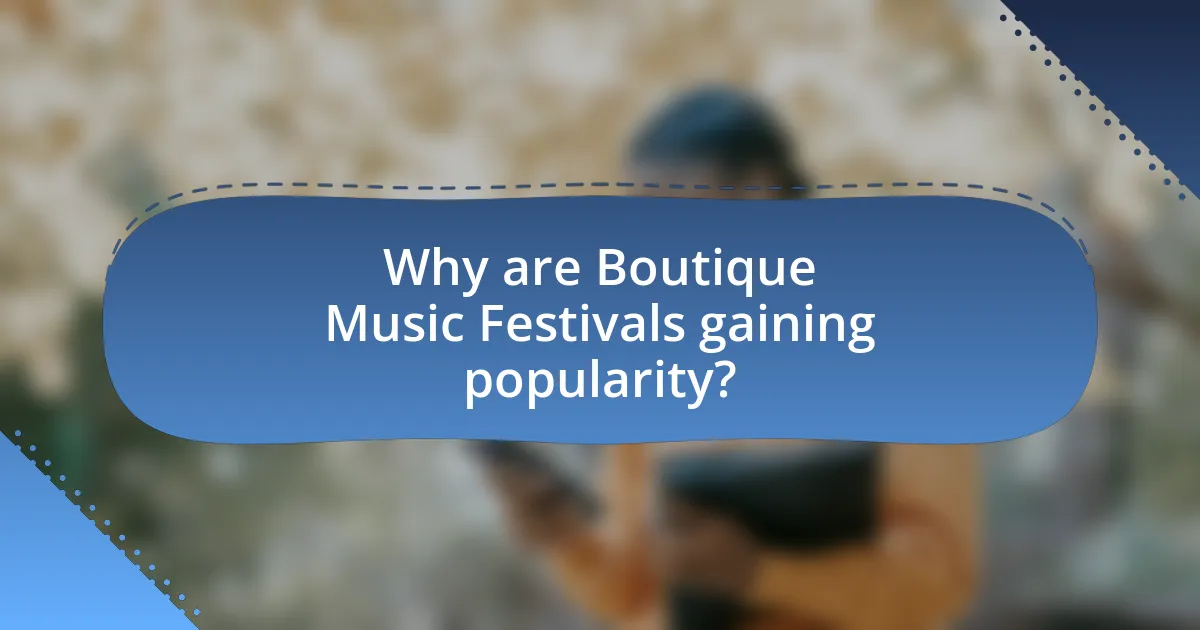
Why are Boutique Music Festivals gaining popularity?
Boutique music festivals are gaining popularity due to their focus on intimate experiences and curated lineups that foster a sense of community among attendees. These festivals typically feature a smaller number of artists, allowing for a more personal connection between performers and audiences. Additionally, the unique settings and immersive environments of boutique festivals enhance the overall experience, attracting attendees seeking authenticity and exclusivity. According to a report by Eventbrite, 70% of festival-goers prefer smaller, boutique events for their personalized atmosphere and unique offerings, highlighting a significant shift in consumer preferences towards more intimate music experiences.
What factors contribute to the appeal of Boutique Music Festivals?
Boutique music festivals appeal due to their intimate atmosphere, unique experiences, and curated lineups. The smaller scale of these festivals fosters a sense of community among attendees, allowing for personal interactions with artists and fellow festival-goers. Additionally, boutique festivals often feature diverse genres and emerging artists, providing a fresh alternative to mainstream events. According to a study by Eventbrite, 78% of festival-goers prefer smaller festivals for their unique experiences and personalized offerings, highlighting the growing demand for such events.
How does the intimate setting enhance the attendee experience?
The intimate setting enhances the attendee experience by fostering a deeper connection between participants and performers. This close proximity allows for more personal interactions, creating a sense of community and belonging among attendees. Studies show that smaller crowds lead to increased engagement, as individuals feel more comfortable expressing themselves and connecting with others. For instance, boutique music festivals often feature limited ticket sales, which not only ensures a more manageable audience size but also cultivates an atmosphere where attendees can easily interact with artists and fellow festival-goers, enhancing overall enjoyment and satisfaction.
What exclusivity aspects attract festival-goers?
Exclusivity aspects that attract festival-goers include limited ticket availability, unique artist lineups, and exclusive experiences. Limited ticket availability creates a sense of urgency and desirability, as seen in festivals like Coachella, where tickets sell out rapidly, enhancing the perceived value of attendance. Unique artist lineups featuring emerging or niche performers provide festival-goers with access to music they cannot find at larger events, fostering a sense of discovery. Additionally, exclusive experiences such as VIP access, private lounges, and meet-and-greet opportunities with artists enhance the overall festival experience, making attendees feel special and part of an elite group. These factors collectively contribute to the allure of boutique music festivals, which prioritize intimacy and exclusivity over mass attendance.
How do Boutique Music Festivals cater to niche audiences?
Boutique music festivals cater to niche audiences by curating specific genres, themes, and experiences that resonate with targeted demographics. These festivals often feature a carefully selected lineup of artists that appeal to particular musical tastes, such as indie rock, electronic, or folk, ensuring that attendees connect with the music on a deeper level. For instance, festivals like Desert Daze focus on psychedelic and experimental music, attracting fans who seek that unique auditory experience. Additionally, boutique festivals often emphasize intimate settings, allowing for closer interactions between artists and attendees, which enhances the overall experience. This approach is supported by the growing trend of personalized experiences in the event industry, where 70% of festival-goers express a preference for smaller, more intimate gatherings over larger mainstream events.
What genres or themes are commonly featured in these festivals?
Boutique music festivals commonly feature genres such as indie rock, electronic, folk, and hip-hop. These festivals often emphasize unique themes like sustainability, local culture, and immersive experiences, catering to niche audiences seeking intimate settings. For instance, festivals like Coachella and Bonnaroo showcase diverse lineups that blend mainstream and underground artists, reflecting a trend towards eclecticism and community engagement.
How do organizers select artists for Boutique Music Festivals?
Organizers select artists for Boutique Music Festivals based on a combination of artistic vision, audience appeal, and the festival’s unique theme. They prioritize artists who align with the festival’s ethos and can create an intimate atmosphere, often favoring emerging talent alongside established acts to enhance exclusivity. Research indicates that boutique festivals typically feature a curated lineup that reflects niche genres or specific cultural elements, which helps to attract a dedicated audience and fosters a sense of community among attendees.
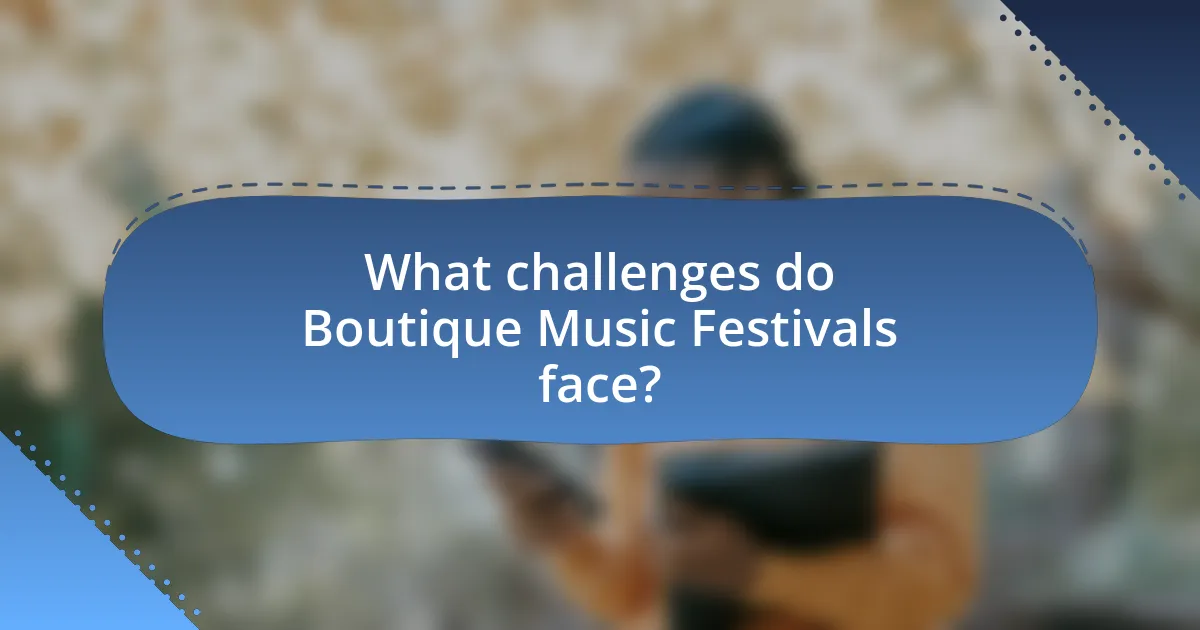
What challenges do Boutique Music Festivals face?
Boutique music festivals face several challenges, including high operational costs, competition from larger festivals, and difficulties in attracting a consistent audience. High operational costs arise from the need for quality production, unique experiences, and often limited sponsorship opportunities, which can strain budgets. Competition from larger festivals, which can offer more extensive lineups and amenities, makes it challenging for boutique festivals to differentiate themselves and draw attendees. Additionally, attracting a consistent audience can be difficult due to the niche nature of these festivals, which may limit their market reach compared to mainstream events. These factors collectively impact the sustainability and growth potential of boutique music festivals.
How do economic factors impact the sustainability of Boutique Music Festivals?
Economic factors significantly impact the sustainability of boutique music festivals by influencing their funding, ticket pricing, and operational costs. For instance, rising costs of venue rentals, artist fees, and logistics can strain budgets, making it challenging for festivals to maintain profitability. Additionally, economic downturns can reduce disposable income for potential attendees, leading to lower ticket sales. According to a report by the Eventbrite team, 70% of festival organizers cite financial constraints as a primary challenge, highlighting the direct correlation between economic conditions and festival viability. Thus, economic factors play a crucial role in determining whether boutique music festivals can thrive or face closure.
What are the financial risks associated with organizing these events?
The financial risks associated with organizing boutique music festivals include high upfront costs, unpredictable attendance, and potential revenue shortfalls. High upfront costs arise from venue rental, artist fees, and production expenses, which can exceed budget estimates. Unpredictable attendance can lead to significant revenue shortfalls, as ticket sales may not meet projections, especially if marketing efforts fail to attract the desired audience. Additionally, unforeseen circumstances such as weather issues or logistical challenges can further exacerbate financial losses, as seen in events like the Fyre Festival, which faced bankruptcy due to mismanagement and lack of funds.
How do competition and market saturation affect Boutique Music Festivals?
Competition and market saturation significantly impact Boutique Music Festivals by driving innovation and increasing operational challenges. As more boutique festivals emerge, they must differentiate themselves through unique experiences, artist lineups, and immersive environments to attract attendees. For instance, the growth of boutique festivals has led to a 20% increase in the number of events in the U.S. from 2015 to 2020, highlighting the competitive landscape. Additionally, market saturation can lead to reduced ticket sales and profit margins, as consumers have more options, forcing festivals to enhance their marketing strategies and customer engagement to maintain viability.
What logistical challenges must organizers overcome?
Organizers of boutique music festivals must overcome several logistical challenges, including site selection, crowd management, and vendor coordination. Site selection involves finding a location that is accessible, has adequate space, and meets safety regulations, which can be complicated by zoning laws and environmental concerns. Crowd management requires effective planning for attendee flow, emergency response, and security measures to ensure safety and comfort, as evidenced by incidents at larger festivals where poor crowd control led to dangerous situations. Vendor coordination entails managing food, beverage, and merchandise suppliers to ensure quality and timely service, which is crucial for attendee satisfaction and overall festival success.
How do location and venue selection influence festival success?
Location and venue selection significantly influence festival success by affecting accessibility, audience experience, and overall atmosphere. A strategically chosen location can enhance attendance by being easily reachable via major transportation routes, while a venue that aligns with the festival’s theme can create a unique ambiance that resonates with attendees. For instance, boutique music festivals often thrive in picturesque settings, such as vineyards or historic sites, which not only attract visitors but also enhance the festival’s exclusivity and intimacy. Research indicates that festivals held in scenic locations can see attendance increases of up to 30%, as the environment contributes to the overall appeal and enjoyment of the event.
What strategies can organizers implement to ensure a smooth experience?
Organizers can implement several strategies to ensure a smooth experience at boutique music festivals. First, thorough planning and coordination among all stakeholders, including vendors, artists, and staff, are essential to streamline operations. For instance, establishing clear communication channels can prevent misunderstandings and delays.
Second, utilizing technology such as mobile apps for scheduling, ticketing, and real-time updates enhances attendee engagement and reduces confusion. A study by Eventbrite found that 70% of attendees prefer using event apps for information, indicating their effectiveness in improving the experience.
Third, providing adequate facilities, such as restrooms, food options, and seating areas, contributes to attendee comfort and satisfaction. Research from the National Association of Music Merchants shows that well-maintained amenities significantly impact overall event enjoyment.
Lastly, gathering feedback through surveys post-event allows organizers to identify areas for improvement, ensuring future festivals are even more successful. This iterative approach to planning and execution is crucial for maintaining high standards in boutique music festivals.
What are the best practices for attending Boutique Music Festivals?
The best practices for attending boutique music festivals include planning ahead, prioritizing comfort, and engaging with the community. Attendees should research the festival lineup and schedule in advance to maximize their experience, as boutique festivals often feature unique artists and intimate performances. Prioritizing comfort involves wearing appropriate clothing and footwear, as well as bringing essentials like hydration packs and sunscreen, given that many boutique festivals take place outdoors. Engaging with the community enhances the experience; attendees can participate in workshops, art installations, and social events that foster connections with fellow festival-goers. These practices ensure a fulfilling and memorable experience at boutique music festivals, which are characterized by their intimate settings and exclusive atmospheres.
